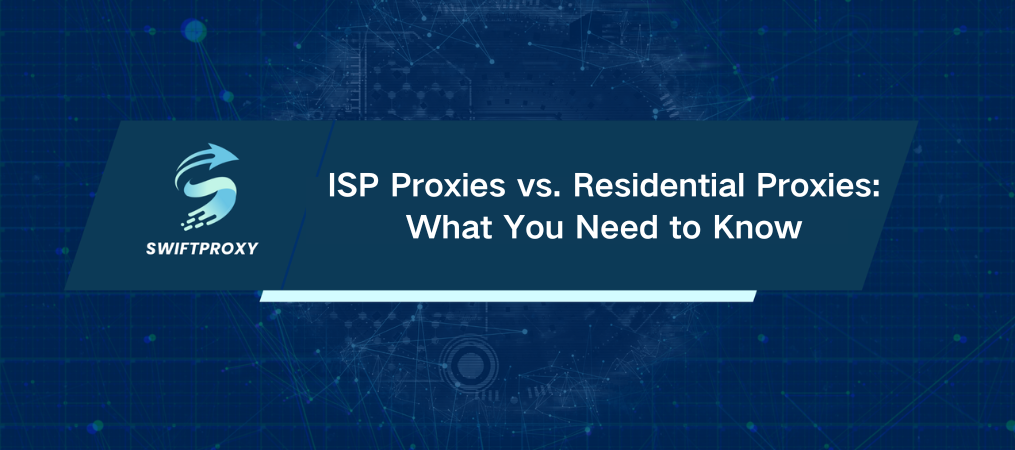ISP Proxies vs. Residential Proxies: What You Need to Know

The world of proxies can be overwhelming. With so many options, how do you even begin to choose the right one? Let's cut through the noise. In this guide, we'll dive into ISP and residential proxies—two of the most widely used proxy types—and break down which one is best for you.
Why Proxies Matter
Before we dive deep, let's take a step back. What are proxies, and why do you need them?
In a nutshell, a proxy acts as a middleman between your device and the internet. It hides your IP address, allowing you to browse anonymously, access geo-restricted content, and perform tasks like web scraping without getting blocked.
Proxies offer:
Privacy: Protect your identity by masking your IP.
Access: Bypass geo-restrictions to get content from anywhere.
Performance: Reduce latency and boost speed for activities like streaming or gaming.
Data Collection: Scrape data without triggering bans.
Now, let's talk specifics—ISP vs. Residential proxies.
ISP Proxies: What Are They
ISP proxies are a hybrid solution. They use IP addresses provided by Internet Service Providers (ISPs), but those IPs are hosted in datacenters, not residential homes. Think of them as a blend between datacenter proxies and residential proxies.
Key Features of ISP Proxies:
Speed: Since they're hosted in datacenters, they're faster than residential proxies.
Stability: Expect high uptime and consistent performance.
Legitimacy: These IPs are recognized by websites as real, reducing the risk of bans.
Residential Proxies: What Are They
Residential proxies use IP addresses assigned to real homes by ISPs. These IPs are tied to physical locations, making them seem like ordinary users to websites.
Key Features of Residential Proxies:
Anonymity: They mimic real users, so they're harder to detect and block.
Geo-targeting: Perfect for accessing content specific to a region.
Security: Due to their high anonymity, they're ideal for sensitive tasks.
ISP vs. Residential Proxies: The Big Showdown
ISP proxies and residential proxies offer different advantages depending on your needs. ISP proxies use IPs sourced from ISPs and hosted in data centers, which makes them fast and cost-effective.
They are ideal for tasks such as web scraping, streaming, and gaming. These proxies offer moderate anonymity, as their IPs are legitimate but not tied to real users. Geotargeting is limited with ISP proxies, as they rely on static IPs that may not cover specific regions. They are great for long-term tasks that require stable IPs.
In contrast, residential proxies use IPs assigned to real users by ISPs, providing high levels of anonymity by mimicking real user traffic, making them harder to detect. They excel in geotargeting, as the IPs are tied to physical locations, making them perfect for regional content, data scraping, privacy protection, and bypassing geo-restrictions.
However, residential proxies are more expensive due to their advanced features and high anonymity. These proxies also use rotating IPs, which are better for tasks requiring frequent IP changes.
While ISP proxies are more affordable and ideal for long-term tasks requiring speed and stability, residential proxies offer enhanced privacy, excellent geotargeting, and flexibility for short-term tasks, albeit at a higher cost.
Use Cases for ISP Proxies
Web Scraping
ISP proxies shine when it comes to scraping data. They're fast, and since they're recognized as real IPs, the chances of being blocked are minimal.
Example: A market research firm uses ISP proxies to collect competitor pricing data without facing bans. In fact, businesses using ISP proxies for scraping report up to a 90% reduction in IP bans.
Streaming
ISP proxies offer blazing speeds, so you can stream content seamlessly.
Example: A user in Asia uses an ISP proxy in the US to watch Netflix content without buffering.
Gaming
The low latency makes ISP proxies ideal for online gaming, reducing lag and improving overall performance.
Example: A gamer in Europe connects to US-based game servers via an ISP proxy, reducing lag significantly.
Use Cases for Residential Proxies
Data Scraping
If your scraping requires discretion and the ability to bypass detection, residential proxies are your go-to.
Example: A research team uses residential proxies to scrape competitor websites without triggering anti-scraping tools.
Privacy Protection
For users focused on anonymity, residential proxies provide robust security by masking their identity.
Example: A journalist in a country with heavy censorship uses residential proxies to access blocked news websites securely.
Bypassing Geo-Restrictions
Want to access region-locked content? Residential proxies are ideal for this, thanks to their location-based IPs.
Example: A user in Europe uses a UK-based residential proxy to access BBC iPlayer and enjoy British TV shows.
How to Choose the Right Proxy
Choosing between ISP and residential proxies depends on your specific needs.
Consider Your Needs
Choose ISP proxies if you need speed and cost-effectiveness.
Opt for residential proxies if anonymity and geotargeting are your top priorities.
Evaluate Your Budget
ISP proxies are more budget-friendly, while residential proxies are pricier but offer advanced features.
Assess Your Use Case
ISP proxies are great for activities like gaming, streaming, and large-scale web scraping.
Residential proxies are better for sensitive tasks like data scraping, privacy, and bypassing geo-restrictions.
Why Swiftproxy Stands Out
Looking for the best proxy service? Look no further than Swiftproxy. Here's why it's a top choice for both ISP and residential proxy users:
70M+ IPs Globally
With over 70 million IPs, Swiftproxy provides a diverse range of options to suit your needs.
City-Level Targeting
Need pinpoint accuracy for geo-targeting? Swiftproxy offers city-level targeting, making it perfect for accessing region-specific content.
Conclusion
ISP proxies and residential proxies each have their strengths. ISP proxies are known for their speed and cost-efficiency, making them suitable for high-performance tasks. On the other hand, residential proxies excel in providing anonymity and geotargeting, making them ideal for privacy protection and localized activities.

















































